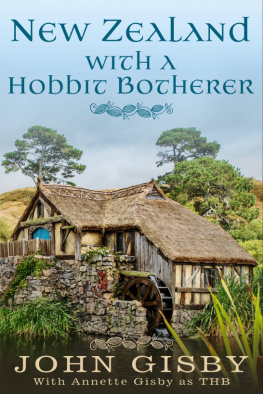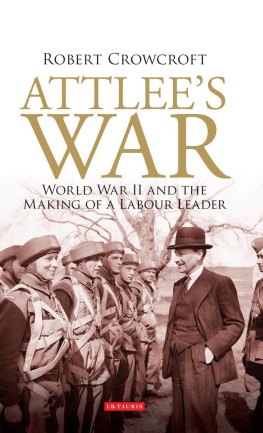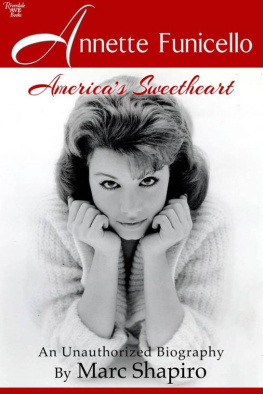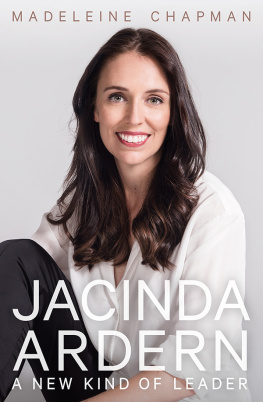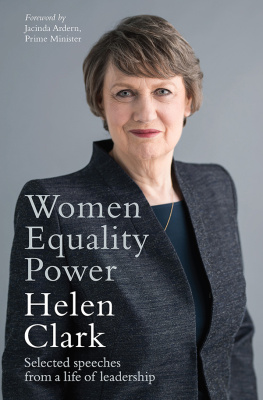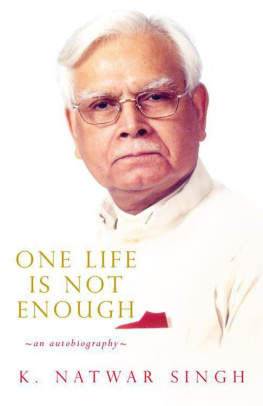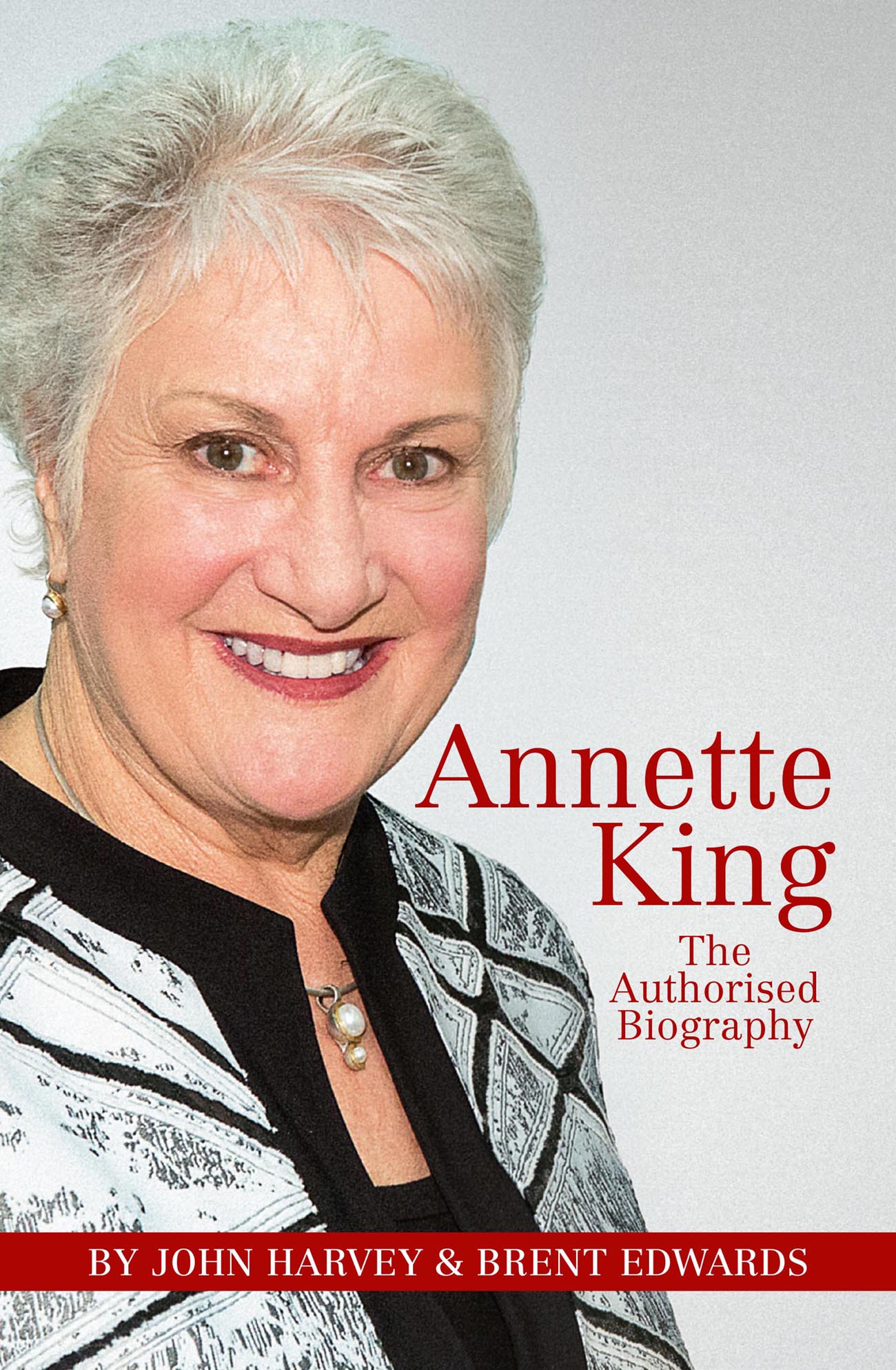A catalogue record for this book is available from the National Library of New Zealand
ISBN
EPUB: 978-1-988516-78-3
MOBI: 978-1-988516-79-0
An Upstart Press Book
Published in 2019 by Upstart Press Ltd
Level 4, 15 Huron St, Takapuna 0622
Auckland, New Zealand
Text John Harvey and Brent Edwards 2019
The moral rights of the authors have been asserted.
Design and format Upstart Press Ltd 2019
All rights reserved. No part of this publication may be reproduced or transmitted in any form or by any means, electronic or mechanical, including photocopying, recording, or any information storage and retrieval system, without permission in writing from the publisher.
Designed by CVD Limited ( www.cvdgraphics.nz )
Cover image: Neil Mackenzie
Almost all of the illustrations for this book were sourced from Annette Kings private collection. Most are personal photos, but some have obviously been presented to Annette by various photographers and do not carry copyright stamps. Any photographer and/or organisation claiming copyright should contact the publishers directly.
Acknowledgments
The authors wish to thank the following people (in alphabetical order) who agreed to be interviewed for this book, or otherwise helped in its preparation: Jacinda Ardern, Steve Chadwick, Helen Clark, Clayton Cosgrove, Michael Cullen, Mary Day, Pauline Eales, Lloyd Falck, Phil Goff, Darren Hughes, Ray Lind, Andrew Little, Steve Maharey, Trevor Mallard, Judy McGregor, Mike Moore, Maggie Morgan, Jenny Newby-Fraser, Geoffrey Palmer, Amanda Parsons, Trish Ranstead, Jenny Rose, Jim Sutton, Liz Tennet, Paul Tolich, Fran Wilde and the many others who provided factual details when we needed them.
Contents
Prologue
The two women could not have been more excited in the early evening of 19 October 2017.
One was on the verge of becoming Prime Minister; the other was stepping down from politics after a career as the longest-serving woman Member of Parliament.
Labour had not exactly recorded a historic result in the 23 September election, and it was still unclear just how strong a position it was in to negotiate to form the next government. But its election-night result of nearly 36 per cent was well beyond the expectations of just a few weeks earlier when it was struggling in the opinion polls around 23 to 25 per cent.
Jacinda Ardern, thrust into the leadership just seven weeks earlier, was standing on the stage at Labours election-night rally almost talking down her supporters expectations. Annette King, too, was disappointed on election night despite Labour recording a vote much stronger than she could have dreamed of just two months earlier.
But a few weeks later, after the special votes had been counted, Labours vote went up to 37 per cent and it picked up another seat, as did the Greens. It meant those two parties, plus New Zealand First, had a combined 63 seats in the 120-seat Parliament. When those numbers came through, Ardern and Annette could again seriously consider the prospect of Labour forming the next government.
Then after days of negotiations with New Zealand First and the Greens, while New Zealand First was negotiating separately with National, Winston Peters finally strode into the Beehive theatrette to announce his party was going into coalition with Labour.
Annette King, former deputy leader, minister, electorate MP, party peacemaker and now mentor of Labours new leader, could leave politics with Labour back in power after nine years of drift and uncertainty.
Everywhere on the campaign trail Annette had been immediately behind Jacinda Ardern. When Ardern was made leader, one of the first things she did was decide King should accompany her throughout the election.
For Ardern, Annette was a mentor and a role model, not just in politics but life.
Annette had this way of being incredibly committed to what she did, totally focused but also balanced in her life. So you could see that she still enjoyed politics and I wondered if that came from the fact that she had this balanced life where she worked hard but also spent time with her family. Whenever she talked to me about how life was going, it wasnt just hows your portfolio, hows the electorate and hows the campaigning? It was also, you know, hows your personal life, whats your living situation now, who are you seeing?
Ardern says Annette cares and she knows that surviving in Parliament and politics is more than about the job.
Often whenever I speak to womens groups about the role of mentors I always say personally for me how important it was having a mentor who cared about my life beyond my work life. [It] was really important to me because that [work] was never how I was going to define all my happiness. So that probably made a big difference to the relationship we had.
Annette might have retired from politics in 2017, but she left a strong legacy for Labour as it reclaimed the Treasury benches it had lost nine years earlier.
Those had been tough years as Labour changed leaders repeatedly and seemed unable to find the unity of purpose which had served it so well from 1996 to 2008. But Annette, who had been through earlier bad times with the party, did not wilt.
She provided a stability to the party it badly needed as it lurched from crisis to crisis. In the end she was to make some of the pivotal decisions personally and for the wider party that put Labour miraculously back in the position to form a government after the 2017 election.
New Zealand and Labours longest-serving woman MP handed on the baton to a new generation of women leaders. And the woman who considered Annette her mentor became Prime Minister.
For Annette, there could hardly have been a better time to walk away from politics.
Chapter 1
A small-town girl
A s a minister in the Helen Clark Labour Government, Annette King returned to her home town of Murchison to ride a horse. In doing so, the idea was to recreate the first time her photograph appeared in a national publication. That was what Murchison had planned anyway. Somewhat less according to plan, however, she came off the horse and broke her foot.
Broken foot aside, she has few memories of her home town that are less than positive or happy.
Im a small-town girl. Murchison was a small community of 600 people. There was lots of freedom to roam, lots of nosy neighbours, everyone knew everyone. Sunday visits and afternoon teas. The movies on Saturday nights. I was the middle child and a sickly child. I was born small and was unwell as a child. When I was four and five, I was sent to live by the seaside with my aunt in Motueka. It must have done me a lot of good because I have had rude good health ever since. I also had some problem with my feet. I used to have to wear boots with orthotics to correct my feet. I was also a skinny kid. In fact, my name was Skinny Robinson.
But, boy, did I have a good childhood. My parents were working. They only had wages. They built their own home. My grandparents lived next door so we had an extended family for most of my childhood. Mum went back to work, when I was about 12, at the Post Office, which was just down the road. Everything was so close that my older sister Raelene used to cook tea for us all, and one of us would ride our bike down with Mums tea on a plate to the Post Office. She was in the telephone exchange. Knock on the door, she would open it, and Id pass through her dinner. Youd come home from school and get on the phone (a party line), and Mum would answer, and you would give her your girlfriends number, and your mother would say, Dont be too long on there because you have to peel the potatoes. And after a certain time, Mum would come across the line, and say, Hang up now, you have had long enough.


